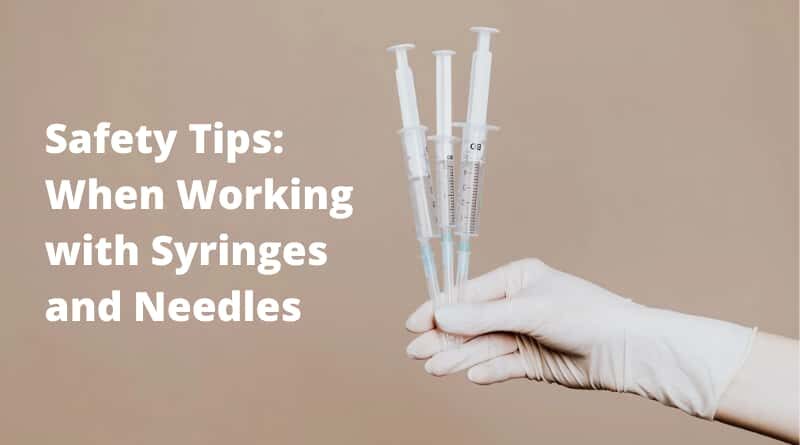How to Stay Safe When Working with Syringes and Needles
Syringes and needles are an everyday part of life working in a hospital, and disposing of them correctly is important to keep the workplace safe. However, if you aren’t aware of the proper disposal practices, you could put yourself and your coworkers at risk for some bloodborne pathogens.
What are the proper safety measures you need to know to dispose of sharps the right way?
Whether you’re handling needles, syringes, or pieces of broken glass, you need to know how to dispose of sharps. Having a bloodborne pathogens training could be of help to understand the risk. Aside from that, here are some tips to help keep your workplace safe.
Table of Contents
Safety Tips When Working with Syringes and Needles
The Dangers of Disposing of Sharps Incorrectly
To understand sharps protective measures, you need to have an understanding of what sharps are. Syringes and needles are just two examples of sharps.
You should use the same methods to dispose of needles with other sharp objects, such as glass shards, lancets, auto-injectors, and other things that could pierce the skin. The reason you need to be careful around these sorts of objects is primarily due to bloodborne pathogens.
Bloodborne pathogens(1) are dangerous microbes that infect the blood. They can be transmitted to other individuals through bodily fluids, such as blood, saliva, and urine. If a syringe still has any fluid left on or inside it and you poke yourself or someone else, you could infect them with the same pathogen.
To reduce the risk of infection, safety precautions have to be followed. Using syringes the right way and properly disposing of needles should be a priority in your workspace.
Read: Advanced Practice Career Options for Nurses
Safety Procedures for Handling Syringes and Needles
Whenever you are handling syringes and needles, there are some safety precautions that you should use. This will keep you safe and prevent the spread of infection.
First, always make sure that you are wearing appropriate personal protective equipment when using needles. Gloves are a priority when handling any sharps. They protect your hands from exposure to bodily fluids that could be infected.
Ensure that the gloves fit, not too loose, and not too tight. Otherwise, you could risk contact with contaminated blood or bodily fluids.
If you are in close contact with an individual with a bloodborne pathogen, you should also wear a mask and safety glasses. Pathogens will take any entrance they can get into your body, including your mouth, nose, and eyes. This equipment will keep you safe while working with the patient; if there is any splash of blood when using the syringe, these pieces of equipment will protect you from infection.
Inspect any needles or syringes before using them to ensure that they are disinfected and in proper working order. If you have reason to suspect that a hand is contaminated or broken in any way, do not use it! Dispose of the needle instead to avoid risk to your patient.
Disposing Sharps
After you have used a needle, you should take steps to dispose of it in the proper area. Disposing of a syringe the wrong way could cause the spread of bloodborne pathogens in your workplace.
First, find a clear container that you can use to store the sharp in. It needs to be leakproof with a lid that attaches firmly to the top. It should also be thick enough that a needle can’t puncture through it.
Once you have placed the sharp inside of the container, close it up and seal the top with tape. Add a label describing what is inside of the container.
Only after you have ensured that the sharp is safe in the container should you dispose of it in a sharps bin. These bins are dedicated to the disposal of sharps only and should be labeled as such. These containers should have a max fill line that cannot be gone over; this is to protect those using the bin.
Once the bin is full, a licensed waste removal contractor will handle the contents of the container. Do not attempt to empty the container on your own; instead, inform your employer if a bin is nearly full so that they can handle it.
Read: Benefits to pursue a career in Nursing
What to Do if You Discover a Syringe or Needle
If you find a syringe or needle on the ground and you aren’t sure what it’s from, you need to use caution. Do not pick up the needle until you have taken the following steps.
Wear gloves to protect yourself from accidental pokes; you have no idea what the needle has been used for or what it could be contaminated with. Inform your supervisor before making any attempts to handle or remove the needle from its area.
Secure the area after you have informed your supervisor of the situation. Make sure that no patients or coworkers come into contact with the needle. If it is contaminated, this will keep your workplace safe.
Your supervisor will contact the correct people to handle the situation. If you are tasked with removing the needle, you’ll need to find an appropriate sharps container to hold it.
Place the container on the ground next to the needle; carefully use tongs to pick up the needle and place it into the container. Avoid touching the needle with your hands if possible. Once you have placed the sharp in the container, put a lid on it and label it before disposing of it.
How to Handle Bodily Fluids Around Sharps
As the most dangerous aspect of handling sharps is the risk presented by bodily fluids, you need to know how to handle contaminated bodily fluids. If there is blood or any other fluid on or around the patient or sharps, here are the steps you should take.
First, remove any materials that have been affected. Any clothes, sheets, or tools should immediately be removed from the area and disinfected.
Next, using gloves, attempt to remove any fluids from the patient and surrounding area with absorbent towels. Your hospital will have policies on how to dispose of anything used to clean up bodily fluids. Make sure the area has been decontaminated as well as possible.
Finally, disinfect the area with a hospital-grade disinfectant. Be thorough and clean any items or rooms that may have been contaminated. You do not want any fluids sticking around and contaminating others.
What to Do if You Get Poked with a Sharp
You may not be able to prevent an accident while working with syringes and needles. If you are poked with a used needle, you need to protect yourself and keep the bloodborne pathogens from spreading.
Do not cover the wound immediately. Instead, get to a cleaning station and begin washing the affected area with soap and warm water. Be as thorough as you can while cleaning, then disinfect the wound.
Now that you have disinfected the wound, you can apply basic first aid to yourself. Do not have a coworker do it for you if you can avoid it; if you are infected, having them work with you could put them at risk of getting the infection. Use a bandage that covers the entire wound well.
Report the incident to your supervisor and get yourself checked out as soon as possible. You may need to get blood tests and treatments if the syringe had blood in it; any bloodborne pathogens that the syringe contained could have infected you. That’s why it’s important to get treatment right away.
If any fluids got into your eyes, nose, or mouth, your workplace should have flushing stations that you can use to get rid of them. Ask your supervisor where these locations are before an accident happens to protect yourself.
Should fluids get on your skin without getting into your body, you should still wash off the contaminated fluid as soon as possible. Use soap and warm water, then disinfect the area well.
Keep Yourself and Your Workspace Safe
Disposing of syringes and needles the right way is crucial to keeping yourself, your coworkers, and your patients safe from bloodborne pathogens. Follow these guidelines to stop the spread of pathogens in your workplace today. If you have any reason to suspect you or a coworker has been infected, inform your superior right away.
Are you looking to improve your workplace’s training on dealing with bloodborne pathogens? There are a lot of bloodborne pathogens training programs available online that you can check out.




